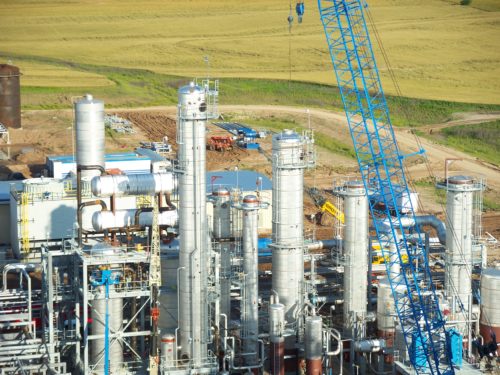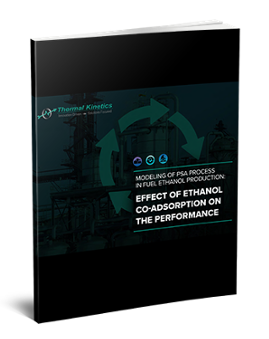PSA Modeling for Fuel Ethanol Production
Comments Off on PSA Modeling for Fuel Ethanol ProductionAs interest grows in environmentally friendly living and consumers demand greener product options, green vehicles — both electric and ethanol fuel — are becoming more and more popular. This, in turn, has led to increased focus on ethanol fuel production — particularly on ways to improve it.
Ethanol fuel production is a complex process, whereby a grain, most often corn, is fermented to produce an alcoholic fermentation broth that is repeatedly distilled until its percent weight (wt %) of ethanol is 95. At this point, the broth is a mixture that is physically incapable of further distillation, making it an azeotrope.
Azeotropic distillation, a process with a very high energy requirement, uses a dehydrating agent to allow for distillation to 99.5 wt % ethanol — true fuel-grade ethanol.
Pressure Swing Adsorption (PSA), which effectively removes water from ethanol to create a purer ethanol product, is one of the best ways to refine this production process.
PSA Modeling Challenges
 The PSA process, which makes use of both advanced adsorption technology and molecular sieves, has become the de facto method across the industry thanks to its ability to provide results comparable to those of azeotropic distillation while using only a small percentage of the energy. This has allowed a great deal of observed data to be collected on PSA operations in real-world scenarios.
The PSA process, which makes use of both advanced adsorption technology and molecular sieves, has become the de facto method across the industry thanks to its ability to provide results comparable to those of azeotropic distillation while using only a small percentage of the energy. This has allowed a great deal of observed data to be collected on PSA operations in real-world scenarios.
Despite the wealth of real-world and observed data, there is still a relative dearth of quantifiable mathematical modeling of the PSA process.
Various factors — including adsorption equilibrium, heat transfer dynamics, and kinetics — can all be modeled to a high degree of accuracy. But in an actual implemented process, the PSA operation is inherently transient, changing subtly due to any number of variables. This type of submodeling, therefore, is inefficient, as it fails to provide precise, true-to-life results.
PSA Modeling Study
Working with a research professor and his graduate students in the Department of Chemical and Biological Engineering at the University of Buffalo, engineers from Thermal Kinetics undertook a study to accurately model PSA functioning, with a particular focus on how co-adsorption of both water and ethanol affects the process. Earlier studies determined equilibrium, kinetics, and behavior of both ethanol and water in contact with 3A Zeolites. A computer simulation program was developed and used to test inclusion or exclusion of ethanol from adsorption.
It was found that excluding ethanol adsorption in the modeling led to a PSA cycle that recovered a greater volume of ethanol — 88.2%, as opposed to 83.2% — and extracted a lower volume of water — 87.8%, as opposed to 93.3%.
The study also showed that including ethanol adsorption, though producing a slightly smaller volume of ethanol, produced purer ethanol than ethanol-excluded adsorption (99.75 wt %, as opposed to 99.42 wt %), partly because of its higher levels of water extraction.
This study ultimately concluded that the results of the co-adsorption modeling more closely resemble real-world collected PSA data than ethanol-excluded modeling. Therefore, it’s recommended to always account for the co-adsorption of ethanol when designing PSA systems as part of fuel ethanol production processes.
Learn More
 For more than 15 years, Thermal Kinetics has been designing, engineering, and developing high-quality, energy-saving process equipment, and we’ve done a great deal of work on PSA process equipment for fuel ethanol production.
For more than 15 years, Thermal Kinetics has been designing, engineering, and developing high-quality, energy-saving process equipment, and we’ve done a great deal of work on PSA process equipment for fuel ethanol production.
To learn more about our PSA modeling study, download our free “Modeling of PSA Process in Fuel Ethanol Production: Effect of Ethanol Co-Adsorption on the Performance,” a detailed reference poster that further breaks down the results.



